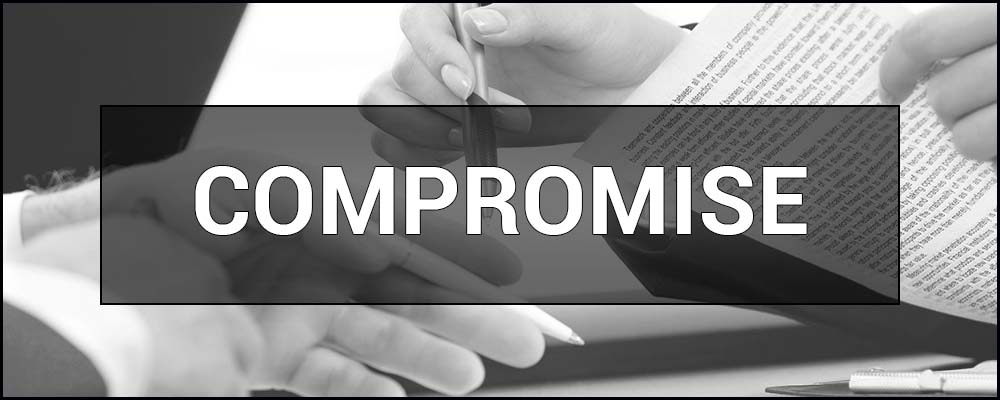A compromise is an agreement or decision reached between two or more parties that have different views, interests, or goals. A compromise implies that each party makes concessions in order to find common ground and achieve a mutually beneficial outcome.
What is COMPROMISE — definition and meaning in simple words.
In simple terms, Compromise is a way to resolve differences or conflicts between two or more parties. It involves finding a middle ground where each party is willing to make concessions in order to reach an agreement that benefits all parties. Simply, it means that both parties give a little to get a little, and everyone agrees to a solution that is fair and satisfactory to all parties. Compromise is an important aspect of human relationships and a valuable tool for resolving disputes, promoting understanding, and creating harmony between individuals and groups with different views or interests.
Compromise is a complex concept that involves negotiation, communication, and a willingness to listen and understand other points of view. It is a way of resolving conflicts that allows each party to feel heard and valued and requires a certain level of empathy, patience, and creativity.
Compromise can take many forms, depending on the situation and the parties involved. It can include finding a middle ground, making concessions, or finding a new solution that benefits both parties. However, compromise is not always easy to achieve and may require time, effort, and creativity to find a solution that benefits all parties involved. Nevertheless, the benefits of compromise are significant, and it can lead to a more harmonious and peaceful world.

The importance of compromise.
Compromise is an important aspect of human relations that plays a vital role in resolving conflicts, promoting understanding, and creating harmonious coexistence between individuals and groups. The ability to compromise allows us to navigate difficult situations, find common ground and reach mutually beneficial agreements. Without compromise, disagreements, and conflicts can escalate, leading to negative consequences such as broken relationships, lost opportunities, and even violence. By valuing compromise, we can build stronger and healthier relationships, both personally and professionally. Compromise allows us to respect and understand the point of view of others while still protecting our own interests. It promotes open communication, empathy, and cooperation, which are essential for creating a better and more just society. Therefore, the importance of compromise cannot be overemphasized, and it is a valuable skill that we should all strive to develop.
Compromise is not always easy to achieve and may require patience, creativity, and a willingness to listen and understand other points of view. It involves balancing the needs and desires of all parties involved and finding a solution that is fair and satisfactory to all. The ability to compromise is especially important in personal relationships, where disagreements can be emotional and complex. In such situations, the ability to compromise can make the difference between a healthy and fulfilling relationship and one characterized by resentment and conflict. In a professional environment, compromise is essential to closing deals, resolving disputes, and creating a collaborative environment. It is a valuable tool for leaders who need to balance the interests of different stakeholders and find solutions that benefit the organization as a whole. Compromise is also vital for resolving political conflicts and creating peaceful coexistence between nations with different values and interests. Without compromise, disagreements can escalate into violence, with devastating consequences for all involved. Therefore, it is important to recognize the importance of compromise and to develop this valuable skill in our personal and professional lives.
Challenges to reaching a compromise.
Compromise can be a difficult process because it requires people to balance their own interests with those of others. It can be difficult to find a middle ground that satisfies all parties, especially when emotions run high or the stakes are high. There may be disagreement about what constitutes a fair compromise, and some parties may be reluctant to make concessions or compromises that they feel are unfair or unreasonable. In some cases, compromise may not be possible, especially when the parties have irreconcilable differences or when the conflict is too deeply rooted. Compromise can also be difficult when there is an imbalance of power between the parties, as the party with more power may be less inclined to compromise or more inclined to impose its will on others.
Here’s a list of the challenges associated with compromise:
- Emotions: Compromise can be difficult when emotions are running high. Emotions can cloud judgment and prevent people from seeing the other person’s perspective.
- Stakes: The stakes involved in compromise can also make it difficult. When there is a lot at stake, such as in business negotiations or political conflicts, parties may be less inclined to compromise.
- Disagreements: Disagreements may arise over what constitutes a fair compromise, and parties may be reluctant to make concessions or compromises that they consider unfair or unreasonable.
- Irreconcilable differences: In some cases, compromise may not be possible if the parties have irreconcilable differences or if the conflict is too deeply rooted.
- Power imbalance: Compromise can be difficult when there is an imbalance of power between the parties. A party with more power may be less inclined to compromise or impose its will on others.
Despite these challenges, the ability to compromise is essential for creating harmonious relationships and resolving conflicts in a peaceful and constructive manner. By recognizing and addressing the challenges of compromise, we can work to overcome them and find mutually beneficial solutions that will benefit all parties involved.

Types of compromise.
Compromise can take many forms and be used to resolve a variety of conflicts. Different types of compromise may be more appropriate depending on the situation and the parties involved.
Here is a list of the most common types of compromise:
- Distributive compromise: This type of compromise involves sharing a limited resource or sharing something of value. Each party may get a share of the resource, but the total amount remains the same.
- Integrative compromise: This type of compromise aims to create value by finding a solution that benefits both parties. It involves identifying common interests and working together to find a mutually beneficial solution that creates value for both parties.
- Aesthetic compromise: This type of compromise involves finding a solution that is visually pleasing or aesthetically appealing to both parties.
- Procedural compromise: This type of compromise involves agreeing to a process or procedure for resolving the conflict. This can be useful when parties have different ideas about how a conflict should be resolved.
- Time-based compromise: This type of compromise involves postponing or extending the timeframe for conflict resolution. This can be useful when parties need more time to consider their options or when there are external factors that affect the timeline.
- Legal compromise: This type of compromise involves finding a solution through legal means. This may include mediation, arbitration, or out-of-court settlement.
- Interpersonal compromise: This type of compromise is aimed at improving relationships and finding common ground. It may involve recognizing each other’s feelings, actively listening, and finding ways to meet each other’s needs.
- Political compromise: This type of compromise is often used in government and politics, where conflicting interests and opinions can lead to a deadlock. It involves finding common ground and making concessions to reach a consensus.
- Tactical compromise: This type of compromise involves strategic concessions to gain an advantage. It can be used during negotiations or in situations where the parties have unequal power or leverage.
- Psychological compromise: This type of compromise involves addressing underlying psychological factors that may be driving the conflict. This may include addressing fears, prejudices, stereotypes, and beliefs that contribute to the conflict.
It is important to note that not all types of compromise are appropriate for every situation. The best approach will depend on the nature of the conflict, the parties involved, and the desired outcome. By understanding the different types of compromise, people can choose the most appropriate approach to resolve the conflict and find a solution that works for everyone.

Compromise — real-life examples.
Compromise is a common part of everyday life and can be seen in many different situations. Here are ten real-life examples of compromise:
- A couple decides to alternate vacations with their family to avoid conflict.
- Employees agree to share the workload on a project to ensure that everyone’s strengths are utilized.
- A landlord and tenant agree on a rent increase that is acceptable to both parties.
- A group of friends choose a restaurant that takes into account the dietary restrictions of each of them.
- A teacher and a student work together to find a compromise in a difficult task.
- Business partners reach a compromise on profit sharing and responsibility.
- A city council agrees on a new zoning policy that meets the needs of residents and developers.
- A divorced couple agrees on joint child custody that suits both parents and children.
- A government compromises on a controversial policy to gain bipartisan support.
- Two countries conclude a treaty that resolves a long-standing border dispute.
These examples demonstrate that compromise is a valuable tool for resolving conflicts and finding solutions that work for all parties involved. In each case, the parties were able to reach an agreement by making concessions and finding common ground. By seeking compromise, individuals, and groups can often achieve outcomes that are more satisfactory than they would have achieved if they had stuck to their own positions.
Conclusion.
In summary, compromise is a fundamental aspect of human interaction and is essential for conflict resolution and finding mutually acceptable solutions. Understanding the importance of compromise and the challenges that may arise during its implementation, people can develop effective strategies for resolving disputes and achieving successful results in negotiations. The types of compromise and real-life examples demonstrate the versatility and wide application of this concept. By embracing compromise, people can work to create more harmonious relationships, resolve conflicts more effectively, and ultimately achieve greater success in their personal and professional lives.




